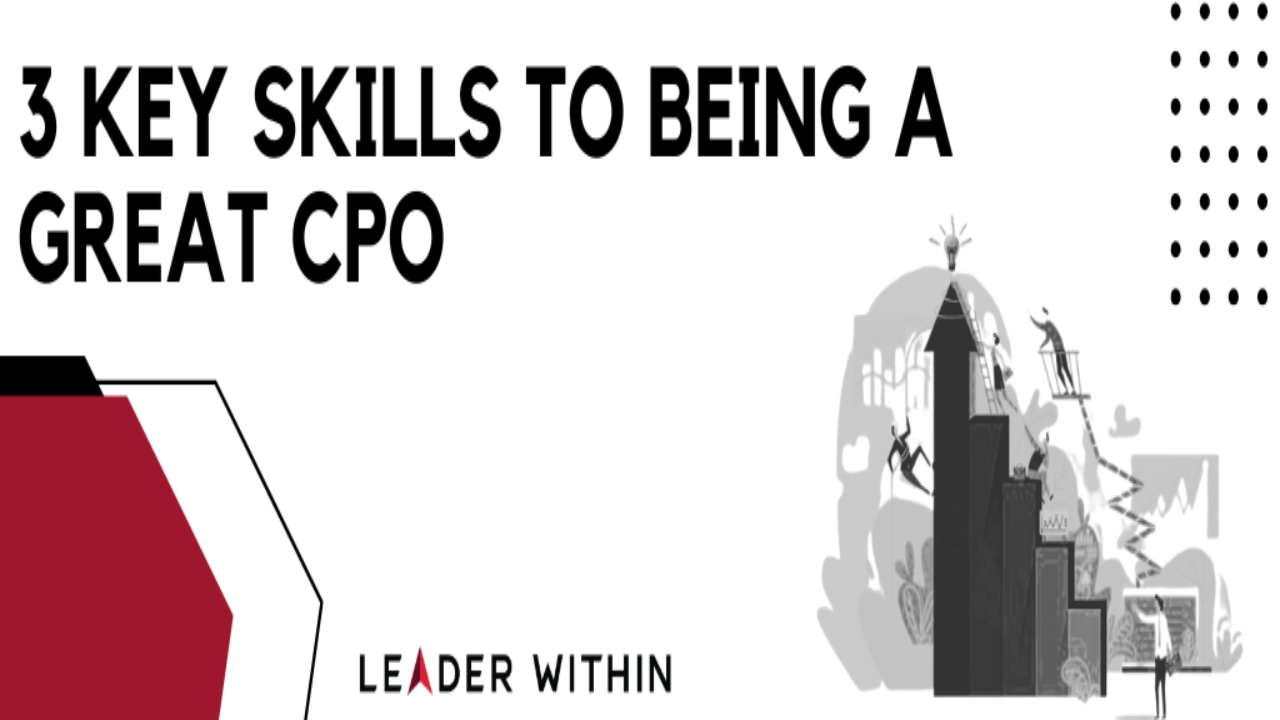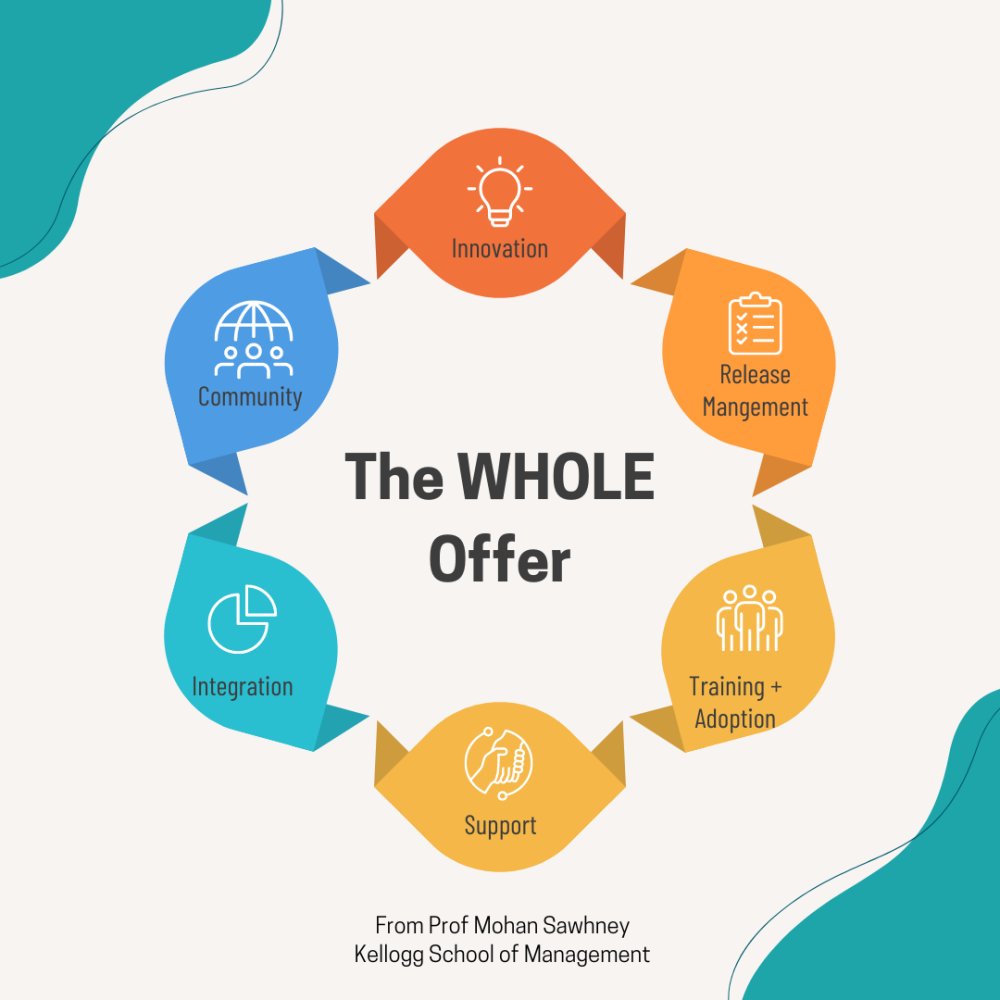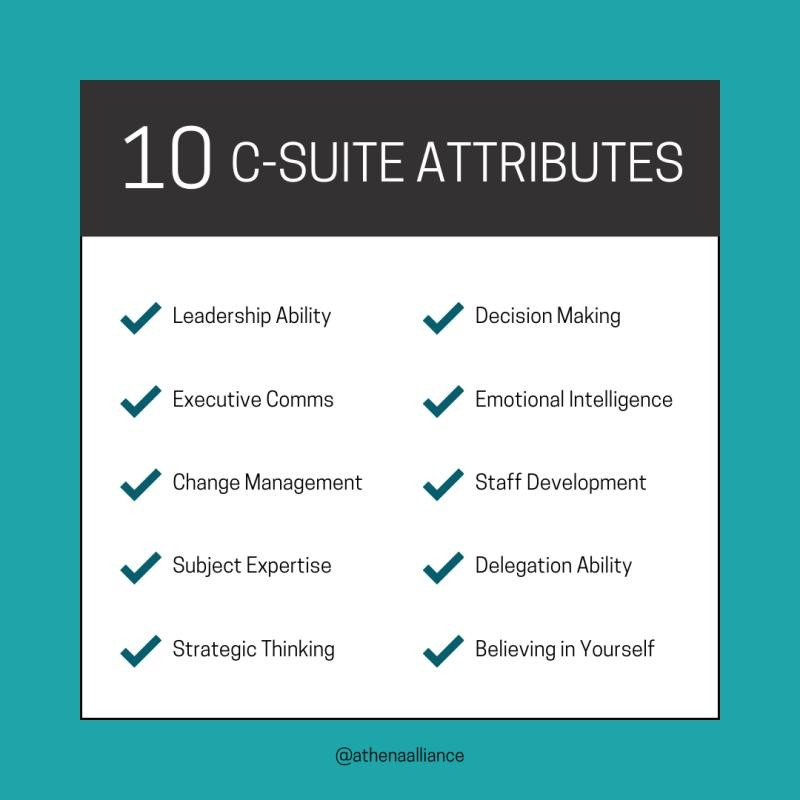
3 Key Skills to Being a Great CPO
Jan 26, 2024WHERE TO: You as a trusted CPO who your CEO, board, and company LOVE.
WHERE FROM: Being a growth-minded product executive who wants to be more effective and confident in your role.
WHERE NEXT: Developing the core competencies that set apart the best CPOs, mastering strategic thinking, team empowerment, and financial acumen.
Over the past four years, I’ve worked with dozens of product leaders, coaching them on their careers. Some are already CPOs honing their craft, others are headed in that direction.
In our discussions, a couple of questions kept emerging: what does it take to be a successful Chief Product Officer? How does a CPO role differ from that of a VP of Product? To answer the latter, I wrote this article, where I outline the differences between a VP of Product and a CPO at growth-stage companies.
But today I want to focus on the first question and discuss the role of the CPO. What sets the best ones apart? If you’re in this position or aiming at it, which skillset should you develop? You spent your entire career executing at a product organization, but is this alone sufficient to take up a leadership position? What could be missing?
Based on my experience working with CPOs, I noticed some patterns. A skillset that led these people to positions where they’re highly trusted across the organization, by their teams, the CEO, and the board.
In this article, I will discuss three core skills that any CPO should have if they want to succeed in their role. If you aren’t sure you’re ready to step up your career, I hope this piece helps you evaluate your gaps and puts you on a path to filling them. And if you want to network with peers in similar positions, head to Collaborative Gain to learn from others - but not before reading the article!
1. Strategic Thinking
In your previous positions as a product team lead, you are likely to have gotten great at execution, with occasional dives into strategy. Now, as a CPO, strategy is where you focus most of your time. Namely, you will:
-
Lead and drive the product strategy for the organization, assuring it aligns with the vision defined by the CEO and the board. This strategy might include a variety of strategic focus areas, such as going up-market, creating a down-market simplified product, selling to enterprises, or expanding geographically, for example. Whatever it is, it’s not your job to execute the strategy but to craft it.
-
Own the quarterly readout of successes and failures to reach key results. You will also be responsible for reporting to the board and CEO which product initiatives are related to each corporate goal and how things are progressing.
-
Evaluate the business viability in addition to the customer valuability of any initiative. This includes additional considerations such as: How will customers learn about and obtain our product?Is the product compliant with any relevant laws and regulations? Is the product consistent with our partnership obligations?Is the product compatible with our brand?Are there any ethical concerns? Are we prepared to deploy and support this product? Does the product have a path to profitability?
-
Think through the whole offer, that is, the entire experience someone has with a product, from start to finish. You need to think beyond the product experience and include implementation, support, and other peripheral aspects.

A CPO is expected to have a holistic approach to product, touching all the areas identified in the image
-
If you’re a great CPO, you will go the extra mile and identify gaps in your portfolio’s offer. This will drive you to evaluate mergers, acquisitions, or partnership opportunities. Previously, you may have had to react to these decisions from the executive team. Now, you will be leading them yourself.
-
Attend to the organization’s general expectations of a CPO, which include:Surface concerns related to the target’s technology or product during due diligenceProvide product-related insights to the rest of the executive team for big company decisions - think M&A or geographical expansionSupport M&A activities, such as execution or integration, once deals are signed
If you master strategy, you’re already on the right track. But a strategy is nothing without a team to bring it to life. That’s why the next step is about deploying that strategy and communicating it in a way that empowers the team you lead to implement it. Let’s see exactly what you can do to empower your team.
2. Team Empowerment
Your title might be Chief Product Officer, but your responsibilities go beyond just Product. You work with people and it’s part of your role to ensure they successfully implement the strategy you created.
So, how can you effectively guide your team to execute well? It greatly depends on your communication skills and how you engage with them. Your goal should be to empower the team to make decisions autonomously, without needing your constant assistance. This creates a network of layers of product, design, and engineering individuals who cascade down the important information. When this is done well, it enables everyone to understand their role in driving product innovation and achieving success.
Now, let’s look at some practical ways you can empower your people, allowing them to operate with a sense of autonomy and ownership:
-
After you set the highest-level goals for the organization, encourage the product managers to take ownership of how their teams will accomplish them. By holding them accountable for hitting those targets, they will become more self-reliant and better at making ground-level decisions you cannot be involved in.
-
Create teams of missionaries. As Marty Cagan puts it, the strongest product teams are missionaries, not mercenaries. This means they should know that they are part of something bigger than themselves. They should feel engaged, motivated, and invested. When teams have a solid understanding of the business context and empathy for customer problems, they have everything they need to make good decisions.
-
Deputize your VPs and Directors to reinforce the product strategy and culture of empowerment. Keep a pulse on the team's skills and suggest opportunities to uplevel the product organization as the company scales. Consider taking this assessment, which helps guide product leaders through coaching and upskilling discussions.
-
Ensure that data is accessible throughout the company so that it can guide impactful decisions. Remember that you need your teams to execute your strategy, and data is a powerful ally in that. When you have a team that knows how to analyze data, they can be more confident in the decisions that they make.
-
Enforce the need for ongoing engagement with customers across the product organization. If data is king, engaging with customers is queen. The best product leaders know regular interaction with customers is key to success. If the product team you lead is known to be strong customer advocates, their influence and impact will grow.

-
Lead by example and engage with strategic customers who require executive interaction. This may be in the form of a customer advisory board (CAB) or more one-on-one. Consider having one of your deputies lead a Voice of the Customer program which everyone leverages to influence their individual product strategies.
-
Bet on the growth of individuals. Most people don’t leave companies, they leave poor managers. It’s up to you to make sure this doesn’t happen at your organization. Does everyone have opportunities to develop and grow? Are they being challenged and advancing in their careers? Create a culture of growth.
-
Provide the opportunity for skip level one-on-ones with individual contributors every quarter. This will help you understand where your direct reports are succeeding or failing. If you take that feedback and coach your team to advance their management skills, you will gain their respect and loyalty.
You should have plenty of opportunities to develop the two skills mentioned above as you move your way up the ladder towards CPO. Embrace these opportunities as moments of learning and growth for yourself. By mastering these skills, you will become a strong product leader and an excellent candidate for any VP of Product role.
But a CPO needs to deliver more. This final skill is one that will set you apart, but unfortunately, is the hardest to gain experience with: knowledge of finance.
3. Financial Acumen
This is likely the skill you have exercised the least in your previous roles. Financial acumen is typically not required for Product Managers or mid-level leaders, but it is a fundamental skill for CPOs, as they must be able to connect all the outcomes their teams focus on with business metrics. This is because the people you interact with the most are no longer members of the product team, but rather executive team members such as the CEO, CFO, COO, CRO, and board members. Most individuals in these roles have some sort of financial or sales background, and more importantly, they all have the responsibility to grow the company in a financially healthy way. They are also evaluated based on the financial success of the company and its products. Therefore, it is important for you to speak their language and understand their objectives.
Many professionals aspiring to become CPOs often hear the feedback that they need to improve their executive presence. This often means more than public speaking skills and hints that more importantly, they need to enhance their financial knowledge.
Let's explore what you can do to better equip yourself with this valuable skill.
-
Ensure that product initiatives directly align with financial impacts for revenue and cost. You must understand financial statements and use data to make decisions about where to focus your team's energy. Putting it simply: everything you do should be driven by numbers.
-
Be a good financial storyteller. Product people know they need to be good at storytelling, but as a CPO, you need this skill to extend to finances as well. Connect the dots for others and inspire them to join your vision. You can achieve this by using data, the right graphs, and calculating cost ratios and ROI. In short, connect financials and business value.
-
Speak your audience’s language. As a CPO, you need to know your audience and learn to influence your fellow executives to get them aligned with your vision. Build empathy, and think about how your plans will yield results for other teams. Explain everything within the context of WIIFY. For example, Sales will require you to show how revenue grows, win/loss rates improve, and sales velocity increases. Operations and Finance will want you to discuss cutting costs and improved predictability.
-
Translate everything into business lingo. Coming from a career in product, it’s only natural that you focus on terms such as “adoption” and “velocity”. But operating at the C-level, you’re required to adapt your speech and speak in financial terms. For example, start sharing your team and development resources allocation in terms of money spent. Shift conversations from NPS to churn or retention, and product usage to LTV and net revenue retention.
-
Be influential in organizational decision-making, so that product is not thought of as too much of a cost center without ROI. Instead, leverage product to make Sales and Customer Success activities more efficient.
-
Become fantastic at budgeting and make sure that the product development investment is within OPEX cost and EBITA targets. You don’t want to be the reason the company misses its numbers.
This final skill of confidently discussing financial matters with other executives will distinguish you as an outstanding CPO. It complements your already strong strategic and team empowerment abilities, while also showcasing your comprehensive understanding of the financial aspects of business operations. If you excel in this skill, you can be confident in your position as a true company leader.
Conclusion

Image 2: C-Suite Attributes
As you might have noticed, the skills above are a mix of hard and soft ones. You need to excel at aspects such as financial acumen and analytical skills, but these won’t get you far if you don’t learn how to communicate and empower your teams. A C-suite professional must always be someone with a wide range of abilities that allow them to attend to the diverse needs their role demands.
Above all, these skills become less relevant if you don’t have a key one: a growth mindset. The most successful CPOs are constantly growing, putting themselves out there, being exposed to new ideas, trying new things, listening to feedback, and embracing change. Let this be your driving force and let it spread across your teams. This is the only way the organization keeps moving forward steadily and successfully.
If you want to step up even more, why not hire a coach? Are you worried about the cost? Think about how much it will cost if your skills don’t advance. Do you want to be in the same place a year from now? I bet you don’t, so book a free 30 min intro call with me to learn how I can help you with Product coaching sessions.
Don't miss a beat!
Looking to UNLEASH your leader within? Subscribe for updates right in your inbox!
I hate SPAM too... we will NEVER sell your information, for any reason.

